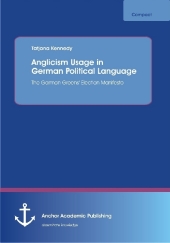 Neuerscheinungen 2014Stand: 2020-02-01 |
Schnellsuche
ISBN/Stichwort/Autor
|
Herderstraße 10
10625 Berlin
Tel.: 030 315 714 16
Fax 030 315 714 14
info@buchspektrum.de |

Tatjana Kennedy
Anglicism Usage in German Political Language: The German Greens´ Election Manifesto
2014. 44 S. 220 mm
Verlag/Jahr: ANCHOR ACADEMIC PUBLISHING 2014
ISBN: 3-9548920-8-1 (3954892081)
Neue ISBN: 978-3-9548920-8-2 (9783954892082)
Preis und Lieferzeit: Bitte klicken
Every four years on Election Day, German citizens make their way to the ballot boxes to vote for the political party and candidate they would favour entering the government. What these voters are not aware of, is that whether their choice has resulted from political conviction or not, the set of political attitudes that found their favour is the result of a complex communication strategy the individual party´s carried out long beforehand. Simply put: through political language, parties exercise power. This study looks at the mechanisms behind the communication strategy the Greens (BÜNDNIS90/DIE GRÜNEN) carried out. It focusses hereby on the language shown in their election manifesto of 2009, specifically analysing the many Anglicisms used. With this, the study gives a theoretical and empirical approach to the question what role the English Language plays in the political Language of German politics, particularly German Green politics.
Text Sample:
Chapter 2.2. Discourse analysis: Political Rhetoric:
In this chapter some expressions or sentences that stuck out whilst reading the Greens manifesto will be outlined, in order get an overview on the strategies the Greens used to influence, convince, confirm or appeal to their readership.
Beard (2000) argues that just like any other field of social activity, also the sphere of politics has an own language variety, a ´code´ (Beard 2000: 5). Such a code consists of certain terms and is also constructed by the use of rhetorical devices. The reason behind the use of this code is to win the voters. ´One of the goals of politicians must be to persuade their audience of the validity of their basic claims.´ (Jones/Stillwell Peccei 2004: 42).
´Metaphors, Parallelisms, or the ´rule of three´´ (Jones/Stillwell Peccei 2004: 49) are means for politicians to rhetorically ´increase the impact of their ideas´ (Jones/Stillwell Peccei 2004: 45) and by that to convince the reader of these thoughts with the aim to receive his or her vote. The Green Party uses all of these three rhetorical devices, and many more, extensively within their program. Examples of each rhetorical device will make apparent how they work and will also serve as an introduction to the Green style of language within the program.
Amongst all of the tools that exist in political speech, Jones and Stilwell Peccei present the reader also with ´presupposition´ and ´implicature´ (cf. Jones/Stillwell Peccei 2004: 42). Presuppositions are ´background assumptions´ (2004: 42) that hide behind sentences or phrases, and that are ´taken for granted to be true regardless of whether the whole sentence is true´. (2004: 42).
Jones and Stilwell Peccei (2004: 42) moreover mention four different ways in which a presupposition can enter a sentence. That is a) through adjectives, and in most cases through adjectives that have a comparative character. B) through possessives, like apostrophe -s possessives in English or the ´Possesivpronomen´ in German; c) by way of subordinate clauses; and d) by using questions instead of statements.
2.3. Contact linguistics:
For any investigation into the language of a certain group it`s important to take into consideration the issues of the language´s etymology and ist current position in the world of languages. Thus, the following theoretical chapter is divided up into three consecutive subchapters. Firstly a historical background to the contact of English and German is given, secondly a brief insight into the role of English in this contact situation and finally a classification is made, regarding the contact-induced outcomes; namely anglicisms. This is done to show what different linguistic methods the Greens used to transport their ideology.
Tatjana Kennedy, B.A., was born 1987 in Dortmund, Germany. She successfully completed a Bachelor of Arts Degree, majoring in English Studies and Political Studies, at the University of Greifswald in 2012. During her studies she worked at the English department of the University and started writing as a freelance editor for different magazines and newspapers. Currently, she completes her Master of Arts Degree in English Studies at the Freie Universität of Berlin.


